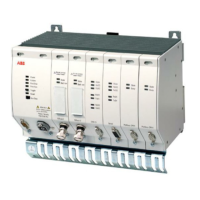4 Cabling the AC 800F
4-95
4.3.5 Redundant cabling of two CAN modules FI 810F
The following section describes the redundant connection of the CAN module. Only
the external termination is considered, as only this is relevant for redundancy.
Do not use an internal termination. Otherwise, trouble-free operation in
case of errors or after module replacement is not ensured, and
redundant cabling will have not effect.
4.3.5.1 Redundant connection of the CAN bus
• Deactivate the internal termination of the CAN module.
• Activate the external termination on the external terminal block.
• Deactivate the termination on the internal terminal block.
• Link two redundant CAN modules with the terminal block TB 870F using cable
TK 831F. Only hand-tighten the screws.
• Put on the TK 831F cable shields. Connect them to the two AC 800F contact
ledges using clips TV 83xF
• Connect the channels 0, 1 and 2 on the terminal blocks to each other, using the
terminals specified below, and establish a connection to the I/O units.
Use twisted pair cable, e.g. 3 x 2 x 0.25 mm
2
or3x2x0.5mm
2
(total bus length
> 80 m) for connecting the terminal blocks to each other. Use the specified
standard cable for connecting the I/O units.
• Observe the max. cable length of 80 m/400 m, depending on the cable used (total
bus length!)
• Apply the shield to terminal P of the terminal block TB 870F.
• Provide a termination at the other end of the bus cable. Use CAN terminations
DSU 01 for the I/O units.
• When touching the terminating jumpers take the necessary ESD
protection measures. Follow the instructions given in Section 2.
• If the shield is not put on properly, neither RFI suppression nor
EMI/RFI shielding of the system can be guaranteed.

